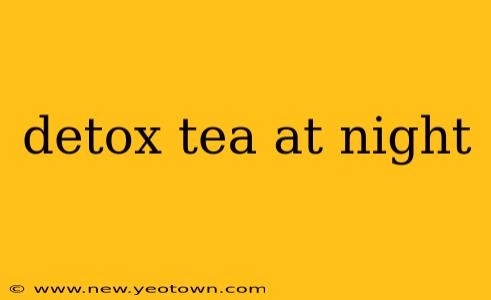The gentle steam rising from a warm mug, the calming aroma filling the air – the ritual of drinking tea before bed is a comforting tradition for many. But when that tea is marketed as a "detox tea," a wave of questions washes over us. Is it truly beneficial to drink detox tea at night? Does it aid in relaxation or disrupt sleep? Let's dive in and explore the complexities of this nighttime beverage.
My journey into the world of detox teas began with a simple question: Could a nightly cup improve my well-being? I, like many, am drawn to the promise of cleansing and rejuvenation. However, my research quickly revealed a nuanced reality. Not all detox teas are created equal, and the timing of consumption can significantly impact their effects.
Does Detox Tea Really Detoxify Your Body?
This is a crucial question, and the answer isn't a simple yes or no. Our bodies possess incredible natural detoxification systems – our liver and kidneys work tirelessly to filter out toxins. While some detox teas contain ingredients with potential antioxidant and diuretic properties, they don't magically "flush out" toxins in a way that surpasses our body's natural processes. Many marketed benefits are often overstated or lack robust scientific backing. It's more accurate to consider these teas as supportive rather than solely responsible for detoxification.
Can Drinking Detox Tea at Night Help Me Sleep?
This depends heavily on the ingredients. Some herbal teas, often included in detox blends, possess calming properties. Chamomile, for instance, is well-known for its relaxing effects and may promote better sleep. However, other ingredients, like those with diuretic effects, might lead to frequent nighttime bathroom trips, disrupting sleep. Furthermore, the caffeine content (even in small amounts) in some teas can interfere with sleep quality. Always check the ingredients list and consider the potential effects on your individual sleep patterns.
What are the Potential Side Effects of Drinking Detox Tea at Night?
The potential side effects vary depending on the specific tea and individual sensitivity. Some common side effects include:
- Diarrhea: Certain ingredients can act as laxatives, leading to digestive discomfort.
- Dehydration: Diuretic effects can lead to dehydration if not properly balanced with sufficient water intake.
- Sleep disturbances: As mentioned earlier, caffeine or other stimulants can negatively impact sleep.
- Interactions with medications: Certain herbs in detox teas may interact with medications, so it's essential to consult your doctor, especially if you take prescription drugs.
What Kind of Detox Tea is Best for Nighttime?
If you're set on drinking a detox tea before bed, opt for those with calming herbs like chamomile, lavender, or valerian root. Avoid teas containing caffeine or strong diuretics. Always read the label carefully and choose a reputable brand that lists its ingredients clearly. Remember, moderation is key.
Is it Better to Drink Detox Tea in the Morning Instead?
Drinking detox tea in the morning might be a more suitable option for those concerned about nighttime bathroom trips. It gives your body time to process the fluids throughout the day, preventing sleep disruption. However, the purported "detoxifying" effects remain largely the same regardless of the time of day.
Can I Make My Own Detox Tea at Night?
Absolutely! Making your own detox tea allows you to control the ingredients and ensure they align with your needs and preferences. A simple blend of chamomile and a touch of honey can offer a soothing and relaxing nighttime beverage.
Ultimately, the decision of whether or not to drink detox tea at night is a personal one. Weigh the potential benefits against the potential side effects, consider the ingredients carefully, and always prioritize your individual health and well-being. If you have any concerns or underlying health conditions, consult a healthcare professional before incorporating detox teas into your routine. Remember, a balanced diet, regular exercise, and sufficient hydration are the cornerstones of a healthy lifestyle, and no tea can replace those fundamental aspects.

